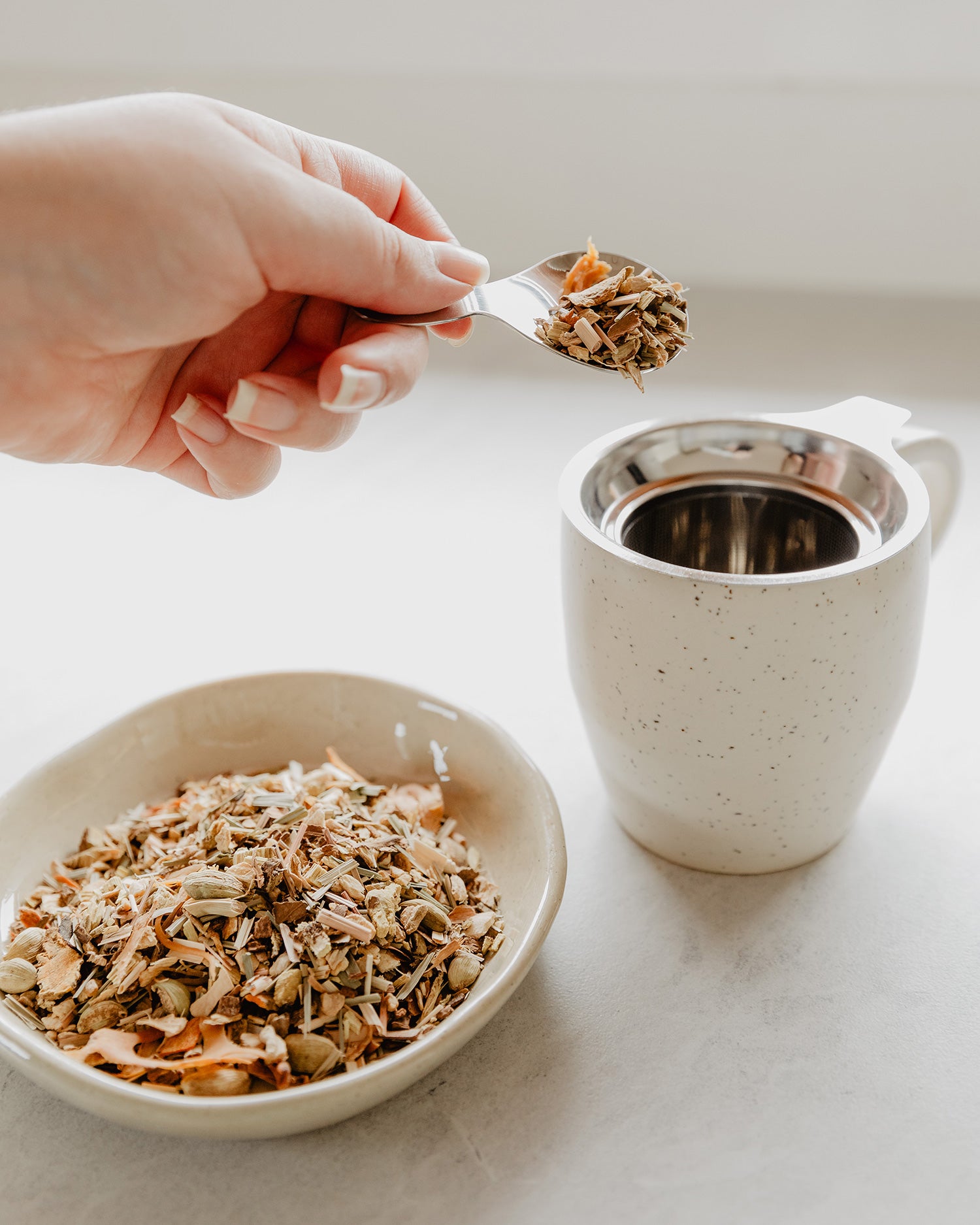What Is Herbal Tea?

Despite being consumed for centuries, herbal tea has recently surged in popularity thanks to all the vibrant and unique flavour combinations on offer, not to mention the myriad of wellness properties we can benefit from. But what is herbal tea? And how does it differ from regular tea?
If we're being proper, herbal tea is not technically a tea as it doesn't contain Camellia Sinensis, the plant from which black, oolong, green, and white tea is derived. Instead, it's an infusion or tisane made with a blend of herbs, flowers, fruits, or edible plants. It's important to mention that herbal tea is also naturally caffeine-free.
If you're new to the wonderful world of herbal tea and don't know your rosehip from your hibiscus, no need to worry, as today, we're chatting you through all our caffeine-free favourites. In an increasingly fast-paced and stressful world, sipping on herbal tea can be a slow and welcoming ritual of creating moments to look after yourself. And although we might be biased, here at Webster's, we believe that tea can be the solution to (almost) everything.
Keep reading for all kinds of interesting tidbits on herbal tea, and some delicious ways to enjoy a cup at home...

Why choose caffeine-free tea?
Caffeine affects everyone differently, with many being ultra-sensitive and others enjoying countless cups with hardly any side effects (how much caffeine is in tea?). And while you might not be ready to give up your morning cup of java just yet, even coffee lovers can enjoy countless cups of herbal tea later in the day to help avoid excess energy or a busy mind before bed.
This brings us to our first compelling reason: herbal tea can be incredibly calming and soothing. Next time you pop the kettle on, relish in each step of the process. Choose your tea with intention, sip slowly, appreciate the aromas, breathe deeply. You have the opportunity to bring a whole new meaning to tea-drinking, should you have the desire to do so!
Secondly, herbal tea is one of the easiest and most enjoyable ways to stay hydrated. This summer, we've been making endless pitchers filled with cold-brew tea (what is cold brewing?) and getting creative with all kinds of fancy add-ins and embellishments. For those who struggle to drink enough water throughout the day, cold-brew ice tea is about to become your fancy new health hack.
And last but not least, we're highlighting herbal tea for it's many health-boosting properties. While water is usually the recommended drink to promote hydration, herbal tea has the added bonus of vitamins, minerals, and antioxidants, making them a tempting alternative to water or sugary drinks. You'll find more info on some of these benefits highlighted in our favourite tea varieties below.

How to brew herbal tea
Because herbal tea doesn't contain Camellia Sinensis, the tea plant which can easily be over-brewed and become bitter, you can be more easy-going when brewing herbal blends without affecting the flavour as much. We recommend adding 1-2 tsp of loose-leaf tea to about 250ml water, with 6-8 minutes of brewing. A lovely tea pot makes the process much easier.
And have you heard about the cold-brew method yet? This refreshing chilled tea couldn't be more effortless to whip up at home, and the flavour possibilities are endless! Check out our simple cold brew method. We're utterly obsessed, and we know you will be too.
To wrap up, here's a list of our favourite herbal teas and why you need them in your pantry
Peppermint is a super herb that's said to stimulate creativity and enhance your dreams. Neat huh? Combined with lemon myrtle and lemongrass, this blend can also help to soothe an upset tummy or aid in digestion. Plus, it also just smells incredibly fresh and invigorating. Serve with a few slices of lemon to enhance it's brightness.
Turmeric, hailed as 'The King of Spice', is a golden root used in Ayurvedic medicine for centuries. Warming and soothing, this herb is blended with ginger, liquorice, cinnamon, lemongrass, and nutmeg to create the ultimate anti-inflammatory tea. Perfect for a boost if you are feeling under the weather.
Pineapple tea is first on the list, as we love how unbelievably refreshing it tastes. Blended with apple and coconut, this fruity, piña colada-esque tea blend will put a pep in your step and bring more tropical vibes into your day. You've got to try it poured over ice or in our virgin pineapple mojito recipe.
Chocolate tea might sound unusual, but this decadent blend of cacao husks, fennel, and liquorice delivers a delicious brew packed with antioxidants, vitamins, and minerals. We recommend serving with a dash of oat milk for an added creamy taste.
Chamomile is beautifully soft and soothing, with the added goodness of orange, lemongrass, and rosehip peel. Said to support relaxation and a restful nights sleep, this delicate flower can also help reduce menstrual pain and muscle spasms, and reduce feelings of stress. Also delicious in our bubbly chamomile spritzer.
Berry tea is a light and fruity number that lends itself to all kinds of serving suggestions. Steaming hot with a spoon of honey or poured over ice with a few sprigs of mint, this naturally sweet herbal infusion is a fantastic way to curb sugar cravings and boost hydration.
And there we have it! We hope this guide inspires you to try something new and think of herbal tea with a fresh, new perspective.
Ps: We're proud as punch to offer better-tasting tea for those who desire more from their tea experience. If this is you, you'll have fun browsing our colourful range. Check out our delicious lineup of teas and accessories.





